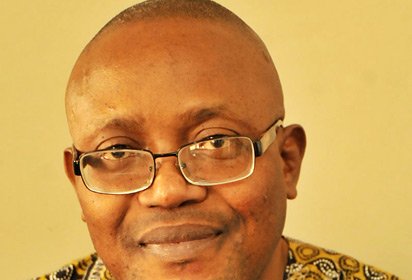Mathematical Politicians, By Owei Lakemfa
Articles/Opinion, Latest Headlines Tuesday, February 23rd, 2016
BALTIMORE, MD (AFRICAN EXAMINER) – Many mathematical problems still elude solution. So, huge rewards are offered for any one that can resolve problems in such fields as partial differential equations, algebra, analysis or combinatorics. The contribution of Nigerian politicians is not to prove the truth or falsity of any mathematical problem, like the unsolved 116-year old Hilbert’s Problems which include algebraic curves, but to add their own mathematical problems.
Let us start with the simple mathematical problems they conjure, to a quite complex one. Last Tuesday, February 16, 2016 the Kogi House of Assembly sat. There are 25 legislators; with five having legal issues, twenty remain. Out of this, fifteen members had passed a vote of confidence in the Speaker, Hon Momoh Jimoh Lawal. But the remaining five legislators reconvened the House, sat in the chambers and impeached the speaker and the House leadership. The five then shared the House leadership amongst themselves with Hon Imam Umar as new Speaker.
The simple mathematical problem posed by the Kogi State Assembly is: 5 legislators are greater than 15 law makers (5>15) Discuss.
Another simple one, was the May 2013 election of the Chairman of the Nigeria Governors’ Forum (NGF). The contest was between the incumbent, Governor Rotimi Amechi of Rivers State who was seeking re-election, and his challenger, Governor Jonah Jang of Plateau State. Thirty five of the thirty six governors in the country were present with only the Gombe Governor being absent. The result was reflective of how many politicians are elected in the country; Amechi lost having scored 19 votes, while Jang won with 16 votes.
In his post-election speech during a Thanksgiving service, Governor Jang told the enthusiastic congregation “I can assure you that my emergence as the chairman Nigerian Governors’ Forum was the will of God because I went to Abuja for the NGF election not with the intention to contest but northern governors and the PDP Governors’ Forum endorsed my candidature. When (Ibrahim) Shema of Kastina stepped down, both forums insisted I should contest; I contested and won. So, it’s the will of God.”
On the allegation that he rigged the election results, the prayerful Jang declared “God is a democrat; he does not support rigging but if you rig and succeed, that means God approves of it.”
The simple mathematical problem the Governors’ Forum presented was; 16 votes are higher than 19 votes (16>19)
Yet, another simple mathematical problem was in Oyo State where cultured businessman, Alhaji Rasheed Adewolu Ladoja assumed office as governor on May 29, 2003. Almost immediately, he was engaged in a stiff intra-party conflict with godfather and party toughie, Alhaji Lamidi Adedibu who then President Olusegun Obasanjo described as the Garrison Commander who must be obeyed. Dr. Ahmadu Ali, then chair of the ruling Peoples Democratic Party (PDP) had also told the elected governor to take directives from Alhaji Adedibu. Governor Ladoja refused and also rejected Adedibu’s demand that he (Adedibu) must be paid a percentage of the state’s monthly revenue allocation from the federation account.
Adedibu then decided to impeach the governor. The State Assembly was made up of 32 members with 14 loyal to the governor, and 18 to Adedibu. Now, Section 188(9) of the constitution stipulates that to impeach a governor or his deputy, there must be ” a resolution of the House of Assembly supported by not less than two-thirds majority of all its members” By ordinary mathematical calculation, two-thirds of 32 is 22. But in the workings of the Oyo State Assembly, with the concurrence of the Federal Government and enforced by the Police, two-thirds of 32, is 18. So Ladoja was impeached, and his deputy, a retired police boss, Christopher Adebayo Alao-Akala replaced him. It took Ladoja almost one year or a quarter of his tenure to fight for reinstatement.
Now the difficult one. Joshua Chibi Dariye was governor of Plateau State. The state had 24 members in its Assembly. Eight of the legislators were captured by the Economic and Financial Crimes Commission (EFCC) under its then Czar, Mr. Nuhu Ribadu. They were like prisoners-of-war. One day, they were transported by their captors back to Jos, the capital with instructions to impeach the governor. Section 188(2) of the constitution states that impeachment proceedings can commence against a governor or deputy governor “Whenever a notice of any allegation in writing is signed by not less than one-third of the members of the House of Assembly”
The impeachment merchants were in good constitutional standing as they had 8 or exactly one-third of the legislators in their custody. The problem was that when they got to the Assembly chambers, two of the legislators refused to co-operate, so 6 legislators or one-quarter of the Assembly was all the impeachers had. This ordinarily should have put paid to the impeachment moves, but the movers did a mathematical recalculation that solved the constitutional challenge; two-third of 24 is 6. With that the impeachment process commenced.
Then came the actual impeachment; the impeachers remained 6 or one quarter, while the constitution prescribes two-thirds as the minimum required to impeach a governor. This is where the politicians presented their ingenious mathematical problem which no mathematician in the world has been able to solve; two-thirds of 24 is 6 not 16. With that, six out of twenty four legislators impeached the governor.
Let me state that Nigerian politicians do not just set mathematical problems, sometimes they actually solve them. Back in 1979 when the country had 19 states, the new constitution stated that to be elected president, the winner must have a minimum 25 percent of the votes cast in two-thirds of the states which non-mathematical minds assumed was 13 of the 19 states. The problem was that the leading candidate, Alhaji Shehu Aliyu Shagari had the required votes in 12 states and less in a thirteenth state. So the politicians sat to resolve the mathematical challenge, and they came up with the solution; two-thirds of 19 is not 13, but twelve two-thirds. With that Shagari became the elected president.
I suggest as a country, that we set aside a huge sum in dollars for anybody who can solve the mathematical problems compounded by our politicians.
Related Posts
Short URL: https://www.africanexaminer.com/?p=30436




















